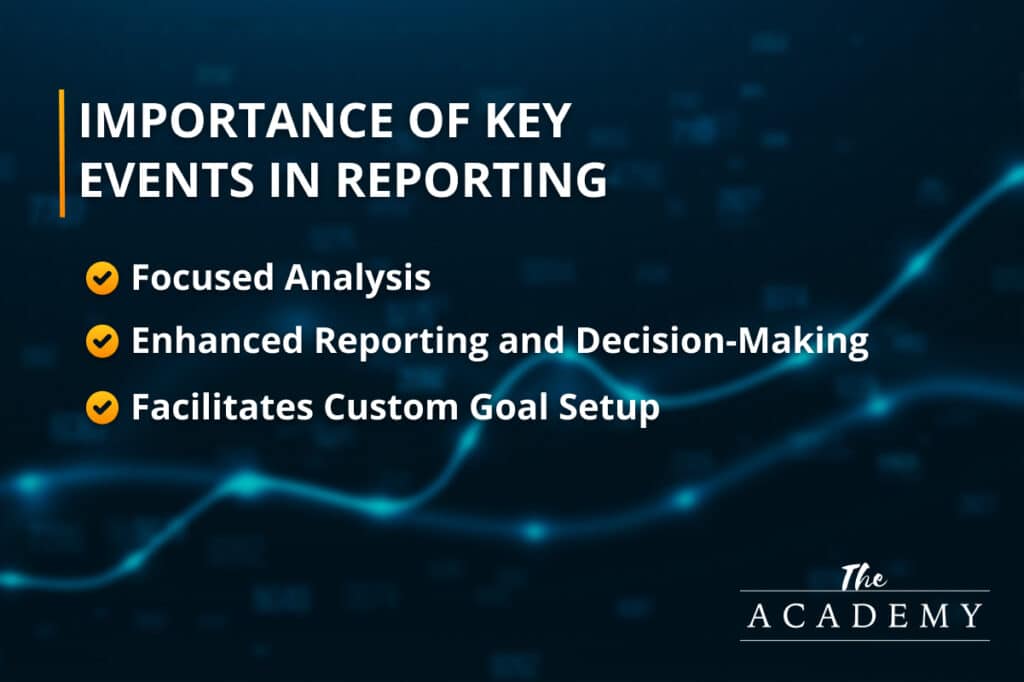
Google Analytics 4 (GA4) is the latest iteration of Google’s analytics platform, designed to provide a comprehensive view of user interactions across various digital touchpoints. At the heart of this platform are “events” and “key events,” crucial elements that allow businesses to track, measure, and analyze user behaviors with high granularity and accuracy.
This article aims to provide a clear understanding of what events and key events are in GA4 and emphasize their significance in reporting.
What is an Event in GA4?
In GA4, an “event” is any user interaction or action that can be tracked on your website or mobile app. Unlike Universal Analytics, where events require manual setup and tracking parameters, GA4 captures a multitude of events automatically. Events can range from a user clicking a button, viewing a page, starting a video, to making a purchase.

Types of Events in GA4
GA4 categorizes events into four main types:
- Automatically Collected Events: These are events that GA4 captures by default, such as page_view, first_visit, and session_start.
- Enhanced Measurement Events: These events track common user interactions automatically when enhanced measurement is enabled, such as scroll, outbound click, and file_download.
- Recommended Events: Google provides a list of recommended events that cater to specific industries and business needs. You have to implement these manually, examples include purchase, login, and sign_up.
- Custom Events: These are unique events defined by you based on specific actions crucial to your business, for instance, phone_click, pdf_download, play_video or share_social.
What is a Key Event in GA4?
Recently Google changed “conversions” to “key events” to simplify conversion measurement and reporting across Google platforms. The term “conversion” now aligns with how conversions are defined in Google Ads, addressing previous discrepancies across platforms. Important events previously labeled as “conversions” in Analytics will be reclassified as “key events”. These key events, when shared with Google Ads, will be considered conversions, facilitating more accurate performance measurement of ad campaigns and enabling better-informed marketing decisions.
A “key event” in GA4 is an event that you have designated as particularly significant for your analysis and reporting. Key events help prioritize data collection and focus on interactions that are directly aligned with your business goals and Key Performance Indicators (KPIs).

Key events are essentially the events you deem most valuable for your data-driven decisions. These could include:
- Conversions such as purchases or sign-ups
- Important user interactions like forms submitted or video plays
- Micro-conversions like add-to-cart actions or newsletter subscriptions
When you decide what KPIs are most important to your digital marketing and business growth strategy, you can easily tailor your reports to see exactly what you care about and nothing more or less.

When someone triggers the event by performing the action, the key event is recorded in Google Analytics and surfaces in your Google Analytics reports. Any event you collect can become a key event. To measure a key event, create or identify an event that measures the action and then mark the event as a key event. After you mark the event as a key event, you can see how many users perform the action and evaluate marketing performance across all channels that lead users to perform the action.
Importance of Events in Reporting
Fine-Grained User Interaction Tracking
Events offer detailed information on how users interact with your website or app. By tracking a broad range of user actions, events help you understand user behavior down to the smallest detail.
Enhanced Flexibility
The event-based data model in GA4 provides an unparalleled level of flexibility compared to page-based tracking models. You can track practically any interaction without predefined parameters, offering customizable and scalable tracking options.
Improved Analytics and Insights
By analyzing events, you gain insights into the user journey, identifying obstacles in conversion funnels and areas for optimization. Events help you understand what actions lead to desired outcomes and which areas require attention.
Importance of Key Events in Reporting

Focused Analysis
Designating key events enables you to narrow down your focus to the most critical interactions on your site or app. This prioritization helps streamline and make for a more impactful analysis.
Enhanced Reporting and Decision-Making
Key events align with your business objectives, providing clear metrics for performance evaluation. By filtering your reports to focus on key events, you can derive actionable insights that are directly correlated with your business success.
Facilitates Custom Goal Setup
In GA4, setting key events as conversions allows for precise tracking of significant user actions. This conversion tracking helps monitor progress toward strategic goals and measure the success of marketing campaigns.
Events/Key Events Help to Align Your Strategic Objectives
Events and key events are essential concepts in GA4 that offer granular insights into user behavior. They allow for the tracking of diverse user interactions, leading to enhanced analysis, reporting, and data-driven decision-making. By understanding and leveraging events and key events, businesses can better align their analytics with their strategic objectives, ultimately driving growth and success.
Most Popular Articles

Seeing Favicons in Your Google Search Results? Here’s Why…
Have you noticed anything different in your Google Search results lately? Google added tiny favicon icons to its organic search results in January. It was…

Business Growth and Digital Marketing News & Tips 11-17-24
Are you encouraging and rewarding innovation? Lee Cockerell is the former Executive Vice President of Operations at Walt Disney World. A lover of traditional red…

Business Growth and Digital Marketing News & Tips 11-27-24
A culture of gratitude "Feeling gratitude and not expressing it is like wrapping a present and not giving it." – William Arthur Ward Beyond being…








